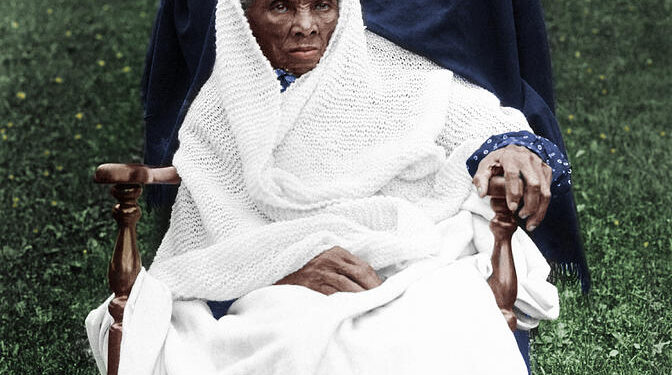April 9, 2025 Story by: Publisher
Harriet Tubman, born Araminta Ross in the early 1820s, remains one of the most iconic figures in American history. Her life and legacy as an abolitionist, humanitarian, and advocate for women’s rights continue to inspire generations. Tubman’s extraordinary courage and unwavering commitment to justice have cemented her place as a symbol of freedom and resilience.
Early Life and Escape from Slavery:
Harriet Tubman was born into slavery in Dorchester County, Maryland. Despite the harsh conditions and brutal treatment she endured, Tubman developed a strong sense of independence and a deep faith that would guide her throughout her life. In 1849, she made the courageous decision to escape slavery, embarking on a perilous journey to freedom in the North.
The Underground Railroad:
Tubman’s escape was just the beginning of her lifelong mission to combat slavery. She became a “conductor” on the Underground Railroad, a secret network of safe houses and routes that helped enslaved people escape to free states and Canada. Over a decade, Tubman made approximately 13 missions to rescue around 70 enslaved individuals, including family and friends. Her remarkable ability to navigate the treacherous terrain and evade capture earned her the nickname “Moses.”
The Underground Railroad was a complex and dangerous operation. Tubman worked with a network of abolitionists, free African Americans, and sympathetic whites who provided shelter, food, and guidance to those seeking freedom. She often traveled by night, using the North Star as her guide, and relied on her resourcefulness and knowledge of the land to avoid detection. Tubman’s bravery and strategic acumen were instrumental in the success of her missions, and she never lost a “passenger” on her journeys.
Civil War Contributions:
During the American Civil War, Tubman served the Union Army in various capacities. She initially worked as a cook and nurse, tending to wounded soldiers and newly liberated slaves. Her deep understanding of the South and its geography made her an invaluable asset to the Union cause.
Tubman’s most notable military achievement was her role in the Combahee River Raid in 1863. Working alongside Colonel James Montgomery, she led a group of scouts to gather intelligence on Confederate positions and resources. Tubman’s leadership and strategic planning were crucial in the success of the raid, which resulted in the liberation of more than 700 enslaved people and dealt a significant blow to Confederate resources. This operation marked her as the first woman to lead an armed expedition in the war.
In addition to her direct military contributions, Tubman also served as a spy and scout for the Union Army. She provided critical information on Confederate troop movements and supply lines, helping to shape Union strategies and operations. Her efforts were instrumental in weakening the Confederate war effort and advancing the cause of freedom.
Advocacy for Women’s Rights:
After the Civil War, Tubman continued her advocacy work, focusing on women’s suffrage and civil rights. She was a prominent figure in the suffrage movement, working alongside leaders like Susan B. Anthony and Elizabeth Cady Stanton. Tubman’s speeches and public appearances highlighted the intersection of race and gender, advocating for equal rights for all.
Later Life and Legacy:
In her later years, Tubman settled in Auburn, New York, where she established the Harriet Tubman Home for the Aged, providing care for elderly African Americans. Despite facing financial difficulties, she remained committed to helping others until her death in 1913.
Harriet Tubman’s legacy is profound and far-reaching. Her life exemplifies the struggle for freedom and equality, and her contributions to the abolitionist movement and women’s rights have left an indelible mark on history. Tubman’s story is a testament to the power of courage and determination in the face of adversity.
Recognition and Honors:
Tubman’s legacy has been honored in numerous ways. She has been the subject of books, films, and academic studies, ensuring that her story continues to inspire future generations. In 2016, the U.S. Treasury announced plans to feature Tubman on the $20 bill, a testament to her enduring impact on American society.
Conclusion:
Harriet Tubman’s life was a remarkable journey of bravery, sacrifice, and unwavering commitment to justice. Her legacy as a conductor on the Underground Railroad, a Civil War hero, and a champion for women’s rights continues to resonate today. Tubman’s story serves as a powerful reminder of the enduring fight for freedom and equality, inspiring us to carry forward her vision of a just and equitable world.
Source: Britannica

















